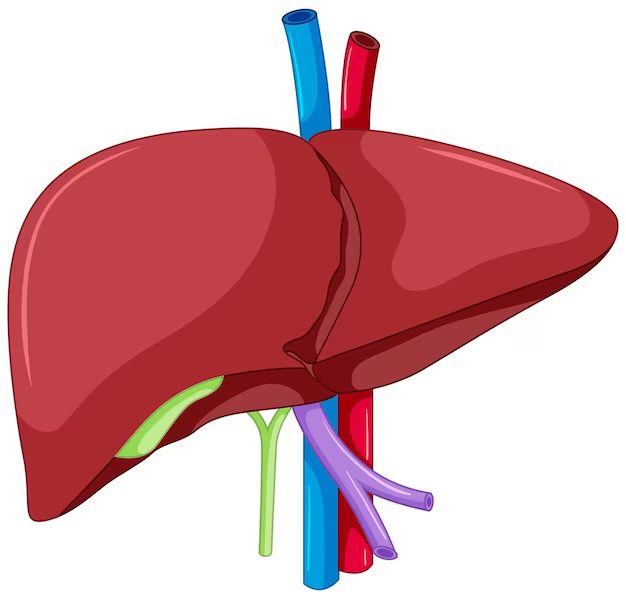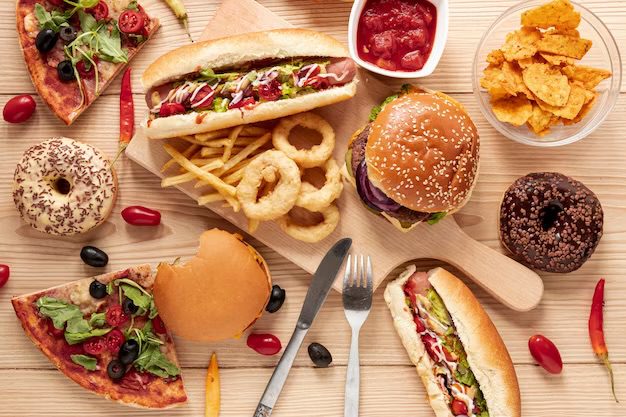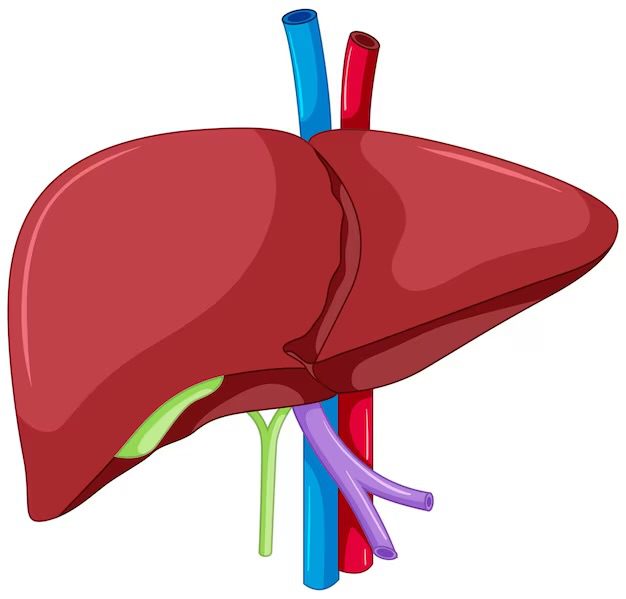This content is for informational and educational purposes only. Always consult a qualified healthcare provider.
Last Updated on February 24, 2024 by Grace Oluchi
The liver is located in the upper right-hand portion of the abdominal cavity, beneath the diaphragm, and on top of the stomach, right kidney, and intestines. Your liver is your body’s largest solid organ. It is vital to your body’s metabolic functions and immune system. And without it, a person cannot survive.
Here’s What It Looks Like


📋 Table of Contents
Foods That Can Slowly Harm Your Liver.


If you want to keep your liver safer and happier endeavor to eat less of these foods.
1 . Salty products
Salt and salty foods contain high amounts of sodium. For example, about 100 grams of salt contains around 3000 milligrams of sodium. However, according to the WHO, the daily recommended intake for an adult is no more than 2000 milligrams.
Too much sodium in the body often leads to kidney impairment and changes in water balance. This can disrupt blood filtration and the proper functioning of the liver.
2 . Alcohol
Do you remember the constant message behind most adverts on alcoholic drinks? The message “drunk responsibly” well it’s not there only because they don’t want you to get drunk, but also for your creams.
They’re simply telling you not to overindulge. The liver helps break down alcohol and when you drink too much in a short period, it has to work double time. It’s better not to mix alcohol with carbonated drinks as this can also increase the strain on it.
Regular and excessive drinking reduces the liver’s ability to regenerate and impairs its capacity to break down toxins. And in turn, increase your chances of developing liver disease.
3 . Fried foods
Eating too much of fried products can lead to certain health problems, with your liver particularly being affected. Foods like French fries, burgers, fried chicken, and other foods cooked in large amounts of oil, increase the workload on your organs.
Additionally, many foods that are breaded or contain dairy products further intensify the strain on the liver and gastrointestinal tract. When you eat too much of these foods too much can be detrimental to the health of your liver. Due to the high amount of fats and potentially harmful compounds present after the frying process.
4 . Spicy spices
If you love to add spices all the time when you cook, you might want to slow down starting today. Because the excessive use of spicy seasonings can affect your liver in similar ways toxic compounds would. They make it produce more bile for their processes, and too much bile can accumulate in the bile ducts, which may eventually lead to the formation of gall stones and fatty liver disease.
While it is true that spices can add flavor to your meals and also contain some health benefits, you still need to be cautious when using them. Especially those with pre-existing liver conditions and sensitivities.
5 . Red meats
Yup, that juicy steak or rack or lamb is surely delicious. But you shouldn’t be eating them every day. Too much of these meats can affect your liver, and not in a nice way. Red meat is high in saturated fat, which can slow down its activity. And this can lead to disruptions in the functioning of other important organs in your body.
Protein is indeed essential for our bodies, eating it in large quantities can increase the strain on the body system. Even a strong working liver may find it hard to break down large amounts of protein. So it’s best to reduce how much meat you eat. Before you think it’s all over, there is a healthier option for you, and that is Lean meats, like turkey, tuna, and chicken. They can provide the necessary protein without the high levels of saturated fat.
Read more about Healthy Lean Meats You Should Eat In 2024. , you’ll love it.
Also, learn more about saturated fat here
6 . Sweet carbonated drinks
Most of these drinks are made up of more than half of refined carbohydrates and sugar. The constant intake of these two can negatively affect your organs. Also, they mostly contain corn syrup, which can make you gain weight and affect your liver, in the long run when you eat it too much.
Sweet carbonated beverages are linked with nonalcoholic fatty liver disease. For example, the Diet Coke everyone seems to think is safe to drink, isn’t so safe after all. It consists of plenty amounts of chemical additives, which gives it a rich taste without calories, but lacks any nutritional benefits. The main artificial sweetener added to these drinks is aspartame. High concentrations of aspartame in the body can lead to mitochondrial dysfunction and depletion of ATP in the liver.
This, in turn, can increase your organ’s weight and create more health problems. That’s why you either intentionally reduce how much you drink them or completely avoid them to maintain overall quality of life.
Remember that all your internal organs are more important than some fancy drink!
7 . Fatty foods
You see foods like bacon, potato chips, butter, soft cheese, skin-chicken and other poultry, pork sausage, fatty cuts of meat. Oh, and biscuits, cakes, pastries, cream, soft cream, ice cream, chocolates, and so on aren’t good for you. Why? Because they weaken your internal organs and make them perform poorly. So, if you’re always eating them, you’re or doing yourself any good.
Forget what you might hear, these foods aren’t good options. You can eat them, yes but not all the time. These foods are high in fat, and they cause your liver tissues to become inflamed. They are also one of the main causes of liver cirrhosis and cancer. These foods can cause a rapid increase in harmful cholesterol levels in the blood. Which can trigger the development of heart and vascular problems. To maintain overall good health you should eat these foods in moderation.
8 . Canned fruits
Despite the several health benefits of fruits, overconsumption, especially canned ones, can lead to an overdose of fructose in the body. Fructose serves as a storage form of energy and unlike glucose, which is directly metabolized; fructose is processed differently, that’s why you shouldn’t eat them too much so you don’t put a strain on your liver, raise your blood sugar levels, increase acidity, damage the tissues of other internal organs, and gain a lot of weight.
Canned fruits are particularly harmful because, in most cases, they contain high concentrations of sugar and corn syrup. These added sweeteners significantly increase the fructose content, making them a lot less healthy than their fresh counterparts. To protect all your internal organs, just go for fresh or frozen fruits.
9 . Sweets
Snacks like candies, ice cream, cakes, and so on are major sources of simple carbs. They contain high levels of refined sugar, corn syrup artificial sweeteners, and other food additives that harm your internal organs. What simple carbs do is give you the feeling of fullness for just a short time, and then make you hungry again. In the process makes you overeat, raise your blood sugar levels, and gain extra pounds.
It can also increase the workload on your liver and cause organ obesity. When you choose to eat snacks like ice cream, go for those made from natural cream, without any added flavors.
10 . Canned foods
These foods contain high amounts of sodium, which is used for preserving foods and enhancing flavors. The high concentration of it can lead to fibrosis, which is the initial stage of scarring in the liver tissue. Excessive sodium intake from these foods can disrupt the delicate balance of fluids in your body. And, additionally, put a strain on your liver. It’s simply best you go for fresh or minimally processed foods over canned ones, so you can reduce your sodium intake and protect your organs.
Now here’s some advice you should take. When you want to buy canned foods, look for the ones labeled as low sodium or no added salt. This will help you limit any potential adverse effects on your liver.
List Of Foods That Are Good For Your Liver


- Garlic
- Nuts
- Oatmeal
- Fatty fish
- Olive oil
- Berries
- Grapefruit
- Prickly pear
- Green tea
- Lean proteins
- Whole grains
- Apples
- Citrus fruits
- Avocado
- Green leafy vegetables
- Turmeric
- Beetroot
- Chia and flax seeds
What Your Liver Is In Simple Words
Well, your liver is like a half-moon-shaped organ that is fairly straight on the bottom. It’s slightly tilted in your body’s cavity, with its left portion above the stomach and right portion above the first part of the small intestine.
The location of it is mostly in the right upper portion of your abdomen, just below the diaphragm. Also, a portion of your liver goes into the left upper abdomen.
When it comes to weight, on average it weighs around 3 pounds, and when a person is in adulthood. It is roughly the size of a football. Pretty cool right?
Here’s What The Structure Is ( if you’re curious about it)
So your liver has two main portions or lobes, each further divided into eight segments. Each segment has an estimated 1000 lobules or small lobes. Each of these lobules has a small passage (duct) that flows toward the common hepatic duct.
The liver has a significant amount of blood flowing through it. An estimated 13 percent of your body’s blood, which is about a pint, is in the liver at any given time. So be careful how much toxins you allow to go into it.
How Does The Liver Regenerate?
The most amazing superpower of your liver is its ability to regenerate. This means that even after an injury or surgery to remove tissue, its tissue can grow back to a certain extent. It starts to grow back when the existing cells enlarge. Then, new liver cells start to multiply.
In 1931, there was a study done on rats where two-thirds of their liver was removed, and within a week, the organ returned to its initial weight. Other studies have confirmed these results in rodents and research has shown that it can happen to human beings as well.
Reasons Every Person Has A Liver
Here are some functions of a liver:
- breaking down or converting substances from food like fats and proteins
- extracting energy, vitamins, and minerals
- making toxins less harmful to your body and removing them from your bloodstream
Your liver does this by receiving blood with nutrients from the digestive organs through a vein, called portal vein. The cells of the liver, known as hepatocytes, accept and filter this blood.
It also produces about 800 to 1000 millimeters of bile a day, which travels down to the small intestine and help further break down fats. In addition, it also releases ammonia, a toxic byproduct of the protein breakdown, through your urine in the form of urea.
Some other reasons
- to resist infections making immune factors and removing bacteria from the bloodstream
- Process hemoglobin for use of its iron content ( it stores iron)
- clears bilirubin, also from red blood cells
- produces certain proteins for blood plasma
Symptoms Of Liver Problems
1 . Yellowish skin and eyes, known as jaundice
2 . Pale, bloody, or black stools
3 . Enlarged stomach due to ascites, which may make it uncomfortable to lie down or eat.
4 . Encephalopathy, a brain issue resulting in marked changes in mood, sleep, and cognition.
5 . Extreme tiredness and weakness, often accompanied by a general feeling of malaise.
6 . Persistent nausea and vomiting, which may be accompanied by loss of appetite and weight loss.
7 . Fluid retention in the lower body, known as edema, which causes swelling in the legs and feet.
8 . Dark urine may appear dark in color due to the buildup of bilirubin.
9 . Pruritus, or itching of the skin, can occur due to the buildup of bile salts in the bloodstream.
10 . Joint pain and body aches
11 . Forgetfulness, behavior disturbances, and even coma in severe cases.
12 . Less urine
13 . Poor night vision, especially where there’s poor lighting.
14 . White or clubbed nails
15 . Purple or red spots on the lower leg or arms
16 . Feeling of pressure or pain on the right side of the ribcage, especially after eating.
17 . Spider veins
18 . Cracked heel
19 . A low sex drive
20 . Nose bleeds
If you’re experiencing any of the symptoms above, talk with your doctor immediately. Seek help without any form of delay.
These Diseases Can Develop In Your Liver If You’re Not Careful
Hepatitis
It’s the inflammation of the liver, often caused by viral infections (such as hepatitis A, B, or C viruses), alcohol abuse, or autoimmune conditions. It can lead to liver damage and impaired function.
Biliary atresia
A condition that affects the bile duct and bile flow in newborns. The bile ducts inside and outside the liver become scarred and blocked. This condition can be congenital or occur as a result of inflammation. And it usually requires surgery and in many cases a liver transplant.
Autoimmune hepatitis
Autoimmune hepatitis is a chronic inflammatory liver disease in which the body’s immune system begins to and destroy healthy liver tissues. It can lead to cirrhosis of the liver and other damages over time.
Hemochromatosis
Hemochromatosis is a genetic disorder caused by excessive iron absorption and accumulation in the liver and other organs. Over time, this can lead to liver damage, cirrhosis, and failure.
Cirrhosis and liver failure
Cirrhosis is a late stage of scarring (fibrosis) of the liver caused by many forms of liver diseases and conditions, such as hepatitis and long-term alcohol use. Over time, the liver tissue becomes scarred and non-functional, leading to its failure.
Alcoholic Liver Disease (ALD)
ALD is a metabolic condition that affects the liver. This is caused by prolonged and excessive alcohol use. It may progress differently for each person, but there are generally three stages :
- accumulation of fat in the liver
- inflammation of liver cells
- cirrhosis
It doesn’t matter what type of alcohol but how much quantity you’ve taken over time. Females are more likely to get this condition
Other risks include being extremely high in weight, eating a high-fat diet, and a concurrent hepatitis C infection.
Liver cancer
If cancer develops in the liver, it destroys cells and affects its normal functions. The rates in the United States have tripled over the past 30 years. Risk factors include chronic hepatitis B or C infection, cirrhosis, and excessive alcohol consumption.
Non-alcoholic fatty liver disease (NAFLD)
NAFLD is a condition in which excess fat accumulates in the liver of people who drink little or no alcohol. It is closely associated with excessive fat accumulation, insulin resistance, and metabolic syndrome. Those who carry extra weight and have conditions related to weight problems, such as type 2 diabetes, are more likely to have this disease.
17 Ways To Keep Your Liver Safe And Healthy
1 . Reduce or completely remove processed foods from your diet.
2 . Stop taking sugar and simple carbs
3 . Say goodbye to constant snacking, you know, chips, cakes, sweets, and so on.
4 . Go easy on saturated fats
5 . Limit or stop drinking alcohol altogether.
6 . Stop eating red meats all the time
7 . Start eating plenty of fruits and vegetables
8 . Start moving your body and increase your physical activity. Do at least 30 minutes of exercise.
9 . Avoid extreme diets, detoxes, and cleanses. They’re not necessary to clean your liver. Just start drinking enough water before and after you eat, or lemon water. You can also try green tea in the morning.
10 . Eat lean meats like turkey chicken breast and fish.
11 . Start taking vitamin D
12 . Practice safe sex and avoid sharing needles or other drug paraphernalia to reduce the risk of viral hepatitis infections, such as hepatitis B and hepatitis C.
13 . Minimize your exposure to environmental toxins and chemicals, such as pesticides, household cleaning products, and industrial chemicals.
14 . Wash your hands thoroughly before handling food, cook your meat and seafood thoroughly, and practice proper food storage to prevent foodborne illnesses that can affect the liver.
15 . Get Vaccinated. There are vaccines available to prevent hepatitis A and hepatitis B infections. Just speak with your doctor about whether vaccination is recommended for you based on your age, lifestyle, and medical history.
16 . Use medications wisely, take them as prescribed by your doctor, and avoid taking unnecessary medications or supplements that can harm the liver.
17 . Get regular check-ups by visiting your doctor regularly for health screenings and check-ups. So that you would be able to detect anything early and get immediate help.
Can Liver Disease Be Treated?
It would depend on the diagnosis. Some liver problems can be treated with lifestyle changes. These may include losing weight or not drinking alcohol. Most of the time these changes are usually part of a medical program that includes watching liver function.
Some other liver problems may need to be treated with medication or surgery. And in some horrible cases, where the liver has failed, the patient may need a transplant.
My Advice
Better safe than sorry.
Prevention is better than cure
We hold the power to our health, and what we do matters. How we treat our bodies, what we eat, how we eat them, when we eat them, and how frequently we eat them, will tell, sooner or later. Liver disease can be prevented, if caution is taken. Everything we do matters. And while it may not be easy to suddenly stop eating all these foods, you can try to reduce them little by little until you don’t even crave them anymore. You can do without junk food, you just have to give yourself the chance to learn and adapt.
Treating yourself once in a while is not a bad thing and wouldn’t suddenly make your organs get into trouble. However, when it’s a daily thing, then there’s a problem. You have the power to do the right thing if you’re willing to.
Stay safe out and there and remember to live well and right!

